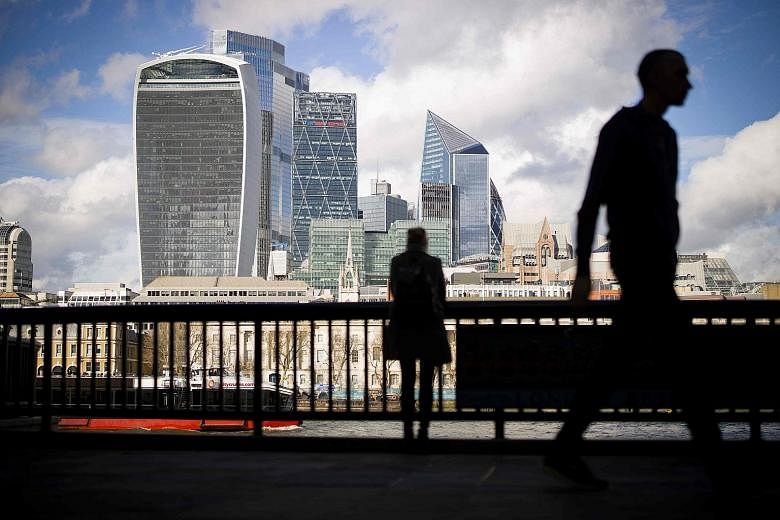LONDON • The Bank of England (BOE) said Britain could be headed for its biggest economic slump in over 300 years due to the coronavirus lockdown, and yesterday kept the door open for further stimulus.
In what it called an "illustrative scenario" rather than a standard forecast, the central bank said Britain's economy was on course to shrink by 25 per cent in the three months to June and for unemployment to jump to more than 9 per cent of the workforce.
Over 2020 as a whole, output was at risk of shrinking by 14 per cent - an annual decline last seen in the early 1700s when Britain was beset by natural disaster and war - despite what the BOE described as "very significant monetary and fiscal stimulus".
The scenario did, however, foresee the economy bouncing back sharply in 2021 with growth of 15 per cent as lockdown restrictions were loosened.
The BOE kept its benchmark interest rate at an all-time low of 0.1 per cent and left its target for bond-buying, most of it British government debt, at £645 billion (S$1.13 trillion), as the stimulus measures taken in March continued to play out. But in a sign that more might be on the way, two of its nine policymakers voted to raise the central bank's bond-buying firepower by £100 billion, and governor Andrew Bailey said the BOE could act again.
He said the BOE expected "the recovery of the economy to happen over time, though much more rapidly than the pull-back from the global financial crisis".
The illustrative scenario was based on the government gradually lifting its lockdown, which has shuttered swathes of the economy, between next month and September.
Some economists doubted Britain would bounce back as quickly as the BOE assumed, after the recovery following the 2008-09 financial crisis took much longer than first expected.
"We see this forecast as credible for 2020, but are less convinced by the 2021 recovery, where we take a more cautious view, implying weaker growth, lower inflation and wider deficits," Morgan Stanley's economist Jacob Nell said.
The government has already rushed out spending and tax measures worth about £100 billion to try to counter the effect of its coronavirus lockdown.
Last week, the US Federal Reserve restated a pledge to keep interest rates low and continue offering trillions of dollars in credit as long as the economy needs it, and the European Central Bank kept the door open to further stimulus.
Minutes of this week's discussions at the BOE showed policymakers thought there were risks that the illustrative scenario could prove too optimistic because people might remain cautious about resuming their normal lives after the lockdown. Workers might be worried about their jobs and companies might also be more risk averse.
The scenario also did not cover the risk of a return of the coronavirus causing a second spike in infections and renewed lockdown.
REUTERS











